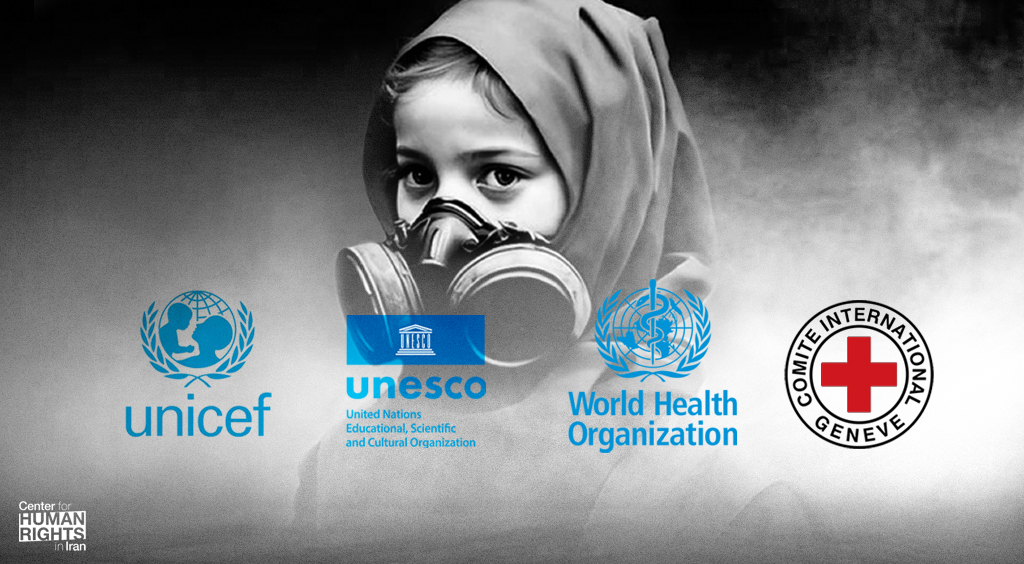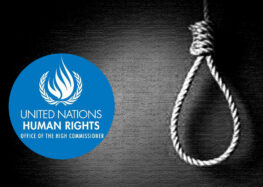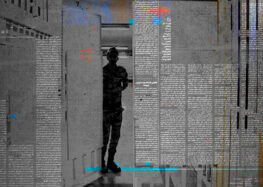20 Prominent Iranian Lawyers Call on UN to Investigate School Girl Poisonings

Over 1,000 Students, Mostly Girls, Poisoned by Gas in Iran Since November 2022
March 6, 2023 – Twenty prominent human rights lawyers from Iran today published a letter urgently calling for an independent, joint committee—comprised of experts from the world’s top public health, children’s rights, and education-focused UN agencies—to immediately investigate the poison gas attacks against schoolgirls that have occurred across Iran over the last several months.
“Due to the Iranian government’s incompetence—or unwillingness—to stop poison gas attacks against schoolgirls in Iran, international support is urgently needed to protect Iranian children and their right to education,” said Hadi Ghaemi, executive director of the Center for Human Rights in Iran (CHRI).
“In a country like the Islamic Republic of Iran, where the government surveils the entire population, how is it possible that a group (or groups) was able to plan and carry out widespread attacks on schools across the country consistently for months without being stopped by the country’s sprawling state security and intelligence apparatus?” Ghaemi asked.
In their formal letter, the lawyers called on three UN agencies—the World Health Organization (WHO), the UN Children’s Fund (UNICEF), and the UN Educational, Scientific and Cultural Organization (UNESCO), as well as the International Committee of the Red Cross (ICRC), a humanitarian aid organization—to investigate the attacks, which have been ongoing in Iran since November 2022, and provide answers for the following questions:
- What is the source of the serial gas poisonings?
- Why are Iran’s schools being targeted?
- Why have the attackers overwhelmingly targeted schoolgirls?
- What actions should be taken to provide urgent and effective aid, support and protection to the children?
More than 1,000 students in 91 schools in 20 provinces across Iran have been attacked by suspected poison gas between November 30, 2022, and March 2, 2023, according to media reports compiled by Etemad Online. The actual number is thought to be much higher.
Hundreds of schoolgirls have been hospitalized due to the gas attacks.
As of this writing, Islamic Republic authorities have still neither identified the source of the attacks nor stopped them.
Following is the full text of the letter by the 20 Iranian human rights lawyers (signatures included) that was sent to the WHO, UNICEF, UNESCO, and the International Committee of the Red Cross.
March 6, 2023
-
- Director General, World Health Organization (WHO)
- Director General, United Nations Educational, Scientific and Cultural Organization (UNESCO)
- Executive Director, United Nations International Children’s Emergency Fund (UNICEF)
- President, International Committee of the Red Cross (ICRC)
We, a group of Iranian lawyers, jurists, and human rights defenders based inside and outside Iran, demand urgent action in response to the systematic chemical attacks on schools in Iran, which have poisoned and hospitalized hundreds of Iranian girls.
Given that:
1- These serial chemical attacks on girls’ schools, which began on November 30, 2022, have spread to more than 12 provinces in Iran and dozens of schools, and almost none of the girls’ schools in Iran are safe from these attacks;
2- The Islamic Republic has not only taken no effective preventive or investigative action to stop or uncover the truth, but also with contradictory statements, recklessness, and suppression of protesting families, has practically embraced the hypothesis that it is involved in these serial crimes or at least benefits from them;
3- Along with the evident indifference in investigating and preventing these atrocities and the incompetence of the government, the evidence clearly shows that the government intended to punish girls and women under the pretext of “weakening Islamic values” by not enforcing the mandatory hijab laws in recent months since the beginning of the “Women, Life, Freedom” movement;
4- The Islamic Republic, in addition to blocking the Special Rapporteur on the situation of human rights in the Islamic Republic of Iran from traveling to Iran, and insisting on non-cooperation with the UN fact-finding committee, has shown that it only pursues its political interests by being a member of international organizations and does not respect their decisions and resolutions.
Therefore, we call upon the above international organizations, each of which is responsible for and has a mission in one of the following specialized areas, to form an urgent, independent joint committee with their representatives to be sent to Iran (or through their representatives in Iran) to investigate or take urgent action on the following four issues:
-
- What is the source of the serial gas poisonings?
- Why are Iran’s schools being targeted?
- Why have the attackers overwhelmingly targeted schoolgirls?
- What actions should be taken to provide urgent and effective aid, support and protection to the children?
Given the legal and international responsibility of the Islamic Republic of Iran for these heinous acts and the necessity of transparent accountability, we ask you to use all available tools in your mandate to ensure that these incidents are immediately and transparently investigated in accordance with international standards and so that the perpetrators are identified and held accountable under the law. Also, we request assurances that special protection will be provided to Iranian school girls.
We are available to provide any necessary support or additional information.
Thank you in advance for your prompt response and action.
Signatories:
Nasrin Sotoudeh
Giti Pourfazel
Syed Mohammad Seifzadeh
Abdolfattah Soltani
Ramzan Hajimashhadi
Payam Derafshan
Farzaneh Zilabi
Saeid Dehghan
Elham Youssefian
Mohammad Moghimi
Mohammad Olyaeifard
Nayereh Ansari
Shirin Maleki
Amin Raad
Hossein Ahmadiniaz
Moein Khazaeli
Hossein Raeesi
Ali Herischi
Hirbod Dehghani Azar
Manoochehr Tavassoli
This report was made possible by generous donations from readers like you. Please donate today.
Read this article in Persian






